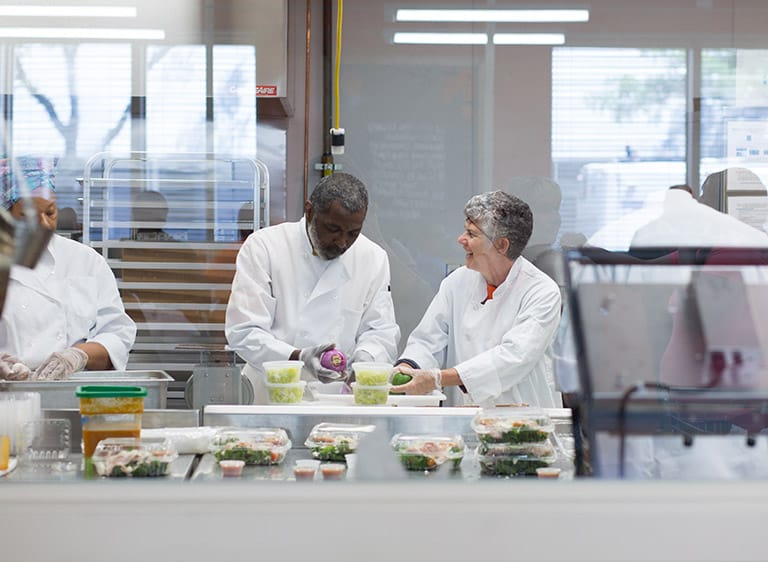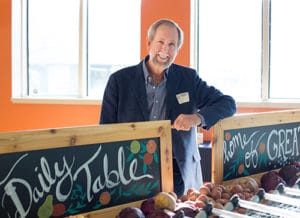Food for Thought

Drucker alumnus and former Trader Joe’s chief Doug Rauch serves up one solution to hunger and waste
Working in the grocery business for more than three decades taught Doug Rauch a few things: Lots of food is wasted. Healthy meals are often beyond the reach of the working poor.
The former president of Trader Joe’s and Drucker School of Management alumnus (EMBA, 1994) is tackling both problems at once with Daily Table, a nonprofit grocery store in the Boston area he launched in June 2015 that sells nutritious groceries and ready-to-eat meals at discounted prices.
Daily Table’s inventory is sourced through a network of suppliers who donate their excess and cosmetically blemished food, as well as products nearing their “sell by” date. The store’s budget-friendly pricing and nutritional focus are intended to compete with fast food restaurants’ cheap, convenient—but largely unhealthy—menus.
“Due to the nature of food systems, calories are cheap and nutrients are expensive,” Rauch said. “When you’re economically strapped, you—unfortunately—can’t afford the food you should be eating.”
Shortage of Nutrients
Rauch worked for Trader Joe’s for 31 years, the last 14 as president, helping the retailer grow from a small Southern California-based specialty retailer into a popular and acclaimed national chain. Rauch started working on his Daily Table idea after he retired in 2008.

The business executive said he was struck by statistics that illustrated high levels of hunger and food waste in America.
More than 17 million American households are “food insecure,” meaning they live in households unable to access enough nutritious food to support active, healthy lives without resorting to scavenging or stealing,
for example, based on 2013 data from the U.S. Department of Agriculture.
“Hunger in America is not like it is in other developing parts of the world,” Rauch said. “It is not, in most instances, a shortage of calories. It’s a shortage of nutrients.”
Food waste is another pressing issue.
In 2012, the Natural Resources Defense Council (NRDC), a nonprofit environmental organization, issued a report that determined Americans throw away 40 percent of the food they purchase every year, wasting nearly $165 billion. Also, unsold but perfectly edible food accounts for a big part of that waste.
“Clearly, the hope is this becomes part of one of the arrows in the quiver that we in America can use to get our arms around and tackle this pernicious problem of food insecurity, this pernicious problem of wasted food,” Rauch said. “We look at the Daily Table as one of the solutions.”
Perfectly Good and Nutritious
“Best by” and similar dates on perishable foods are part of the problem, Rauch and others said.
In a 2013 report, the NRDC and the Harvard Food Law and Policy Clinic concluded that such dates are confusing and prompt consumers to throw perfectly good food away. The dates are intended for use by retailers to rotate their stock and not as indicators of food quality or safety.
Daily Table keeps prices low by sourcing from donations and excess stock, as well as suppliers who provide items nearing ripeness—such as bananas—or closing in on their sell-by dates, such as milk and eggs.
All this food is “perfectly good and nutritious,” Rauch said.
Daily Table’s inventory includes eggs, milk, bread, fresh produce, canned fruits and vegetables, and breakfast cereal. A dozen eggs has sold for $1.99 cents, while bananas have been priced at 29 cents per pound. A loaf of organic whole-grain bread has sold for $1.49.
The Healthiest Grocery Store
Daily Table utilizes some of its stock to prepare and sell meals at fast-food prices to assist those with little time to cook.
A hearty entree of Salisbury steak and brown rice, for example, has sold for $2.99. Tubs of curry broccoli soup have been priced at $1.29.
Rauch sought to ensure that the meals are as nutritious as possible. Menus were designed with input from nutritionists and experts from Harvard University’s School of Public Health and other institutions. Meals are prepared to be low in sugar and salt and high in fiber, for example.
“We are, by far, the healthiest grocery store, in my opinion, in America,” Rauch said.
A Force for Good
Rauch said he was influenced by the writings of Peter F. Drucker. Trader Joe’s founder Joe Coulombe would oftenpass around Drucker’s op-ed columns published in the Wall Street Journal because “he had a great affinity for [Drucker’s] thinking.”
While a Drucker student, Rauch said he gained a deeper understanding of the similarities—and differences—between for-profit businesses and nonprofit organizations.
But he was also influenced by Peter F. Drucker’s insistence that businesses be accountable to society and should operate responsibly and ethically.
“Being a force for good—all these things were both ingrained and reinforced while I was at the Drucker School,” Rauch said.